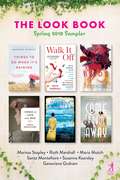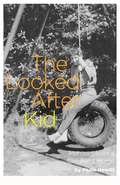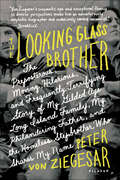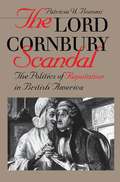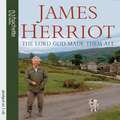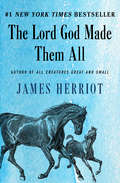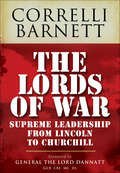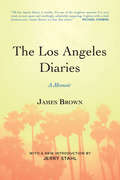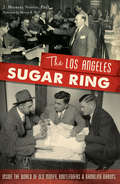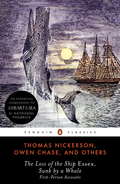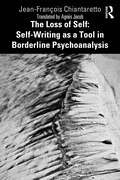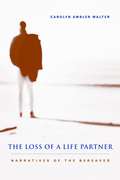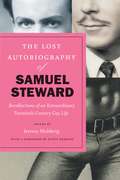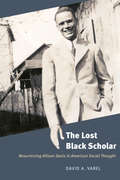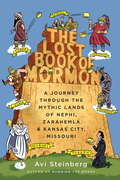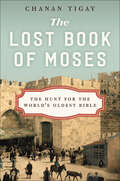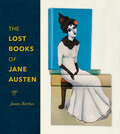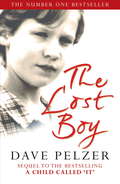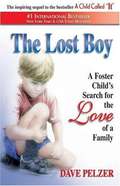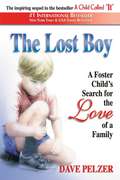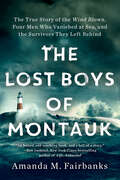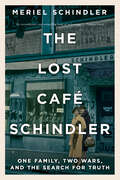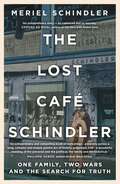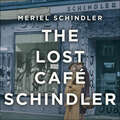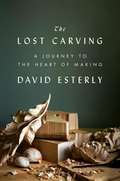- Table View
- List View
The Look Book: Spring 2018 Sampler
by Santa Montefiore Ruth Marshall Susanna Kearsley Maria Mutch Genevieve Graham Marissa StapleyEscape the cold winter and look ahead to all that the spring has to offer with The Look Book, featuring samples from just a few of the highly anticipated fiction and nonfiction titles on Simon & Schuster Canada’s Spring 2018 list. <P><P>This season’s sampler offers an array of options. Spend a summer in an inn on the idyllic St. Lawrence River meeting the innkeepers, their granddaughter, and the boy she has always loved. Laugh out loud with a memoir about one woman’s journey to recovery after a debilitating diagnosis turned her life upside down. Try the startlingly inventive and evocative short stories from a Governor General’s Literary Awards finalist. Travel to Castle Deverill, nestled in the rolling Irish hills, and lose yourself in an epic tale of secrets, and the enduring bond between three women and a castle they will never forget. And finally, dig in to a love story set in 1750’s New York or experience the tumultuous life of Nova Scotia during World War II. <P><P>With chapter excerpts from: Things to Do When It’s Raining, by Marissa Stapley Walk It Off: The True and Hilarious Story of How I Learned to Stand, Walk, Pee, Run, and Have Sex Again After a Nightmarish Diagnosis Turned My Awesome Life Upside Down, by Ruth Marshall When We Were Birds, by Maria Mutch Songs of Love and War, by Santa Montefiore Bellewether, by Susanna Kearsley Come from Away, by Genevieve Graham <P><P> Happy Reading! The Team at Simon & Schuster Canada If you would like to learn more about any of our authors or the titles featured, please visit us at SimonandSchuster.ca, follow us on Twitter at @simonschusterCA, or like us at Facebook.com/SimonandSchusterCanada.
The Looked After Kid, Revised Edition: My Life in a Children’s Home
by Paolo HewittPlaced in care at a very early age, Paolo Hewitt went to live with a foster family where he endured extreme abuse and humiliation. Following years of abuse he was sent to Burbank children's home at the age of ten where he met a gang of children. Like him, they were outsiders struggling to find their place in the world. Paolo paints a vivid picture of his coming of age in the children's home; of bruising fights, failed love, brushes with the law and enduring friendships, and describes how his salvation eventually comes through his passion for music and literature. Gripping and perceptive, The Looked After Kid is is a testament to the resilience of children who 'go to sleep at night believing the world to be a dark and terrible place', but wonderfully emerge from the darkness to shine their lights on all.
The Looking Glass Brother: The Preposterous, Moving, Hilarious, And Frequently Terrifying Story Of My Gilded Age Long Island Family, My Philandering Father, And The Homeless Stepbrother Who Shares My Name
by Peter von ZiegesarPeter von Ziegesar had just moved to New York and was awaiting the birth of his first child when a dark shape stepped from the looking glass of his past on to a Greenwich Village street. The Looking Glass Brother is Peter von Ziegesar's remarkable memoir of a life that began in the exquisite enclaves of Long Island's gilded age families and is now lived, in part, as the keeper of his homeless and schizophrenic stepbrother, Little Peter. The Looking Glass Brother is a feast of memories from one of the last, great estates on Long Island's Peacock Point. Summers were filled with the glistening water of the Long Island Sound, pristine beaches, croquet games, butlers in formal wear serving dinners and an endless stream of cocktails. When, after a string of affairs Peter's father left his mother and remarried, the idyll was broken and several stepchildren, including Little Peter, entered von Ziegesar's life from the looking glass of his father's new family. Little Peter was an angelic and brilliant young boy who spiraled down during adolescence to become one more homeless man living on the street. In this big-hearted memoir, Peter von Ziegesar mixes memories of life on Peacock Point with the turbulent joys of fatherhood and the responsibility he feels for his brother, a man with the same name as his, but a man who lives a desperate and very different life.
The Lord Cornbury Scandal
by Patricia U. BonomiFor more than two centuries, Edward Hyde, Viscount Cornbury--royal governor of New York and New Jersey from 1702 to 1708--has been a despised figure, whose alleged transgressions ranged from raiding the public treasury to scandalizing his subjects by parading through the streets of New York City dressed as a woman.Now, Patricia Bonomi offers a challenging reassessment of Cornbury. She explores his life and experiences to illuminate such topics as imperial political culture; gossip, Grub Street, and the climate of slander; early modern sexual culture; and constitutional perceptions in an era of reform. In a tour de force of scholarly detective work, Bonomi also reappraises the most "conclusive" piece of evidence used to indict Cornbury--a celebrated portrait, said to represent the governor in female dress, that hangs today in the New-York Historical Society. Stripping away the many layers of "the Cornbury myth," this innovative work brings to life a fascinating man and reveals the conflicting emotions and loyalties that shaped the politics of the First British Empire."A tour de force of historical detection.--Tim Hilchey, New York Times Book Review"Bonomi's book is more than an exoneration of Cornbury. It is a case study of what she aptly calls the politics of reputation."--Edmund S. Morgan, New York Review of Books"A fascinating, authoritative glimpse into the seamy underside of imperial politics in the late Stuart era.--Timothy D. Hall, Pennsylvania Magazine of History and Biography"An intriguing detective story that....casts light upon the operation of political power in the past and the nature of history writing in the present.--Alan Taylor, New RepublicFor more than two centuries, Edward Hyde, Viscount Cornbury--royal governor of New York and New Jersey from 1702 to 1708--has been a despised figure whose alleged transgressions ranged from looting the colonial treasury to public cross dressing in New York City. Stripping away the many layers of "the Cornbury myth," Patricia Bonomi offers a challenging reassessment of this fascinating figure and of the rough and tumble political culture of the First British Empire--with its muckraking press, salacious gossip, and conflicting imperial loyalties. -->
The Lord God Made Them All
by James HerriotThe war is over, the RAF uniform has been handed in and James Herriot goes back where he ought to be - at work in the dales around Darrowby. Much has changed, but the blunt-spoken Yorkshire folk and the host of four-legged patients are still the same. So is their vet, who doesn't yet know that literary success is just around the corner...
The Lord God Made Them All (All Creatures Great and Small #4)
by James HerriotAdventures in the English countryside and beyond with the Yorkshire veterinarian and #1 New York Times–bestselling author of All Creatures Great and Small. When World War II ends and James Herriot returns to his wife and new family in the English countryside, he dreams mostly of Sunday roasts and Yorkshire puddings, but new adventure has a way of tracking him down. Soon Herriot finds himself escorting a large number of sheep on a steamer to Russia, puzzling through the trials of fatherhood, and finding creative ways to earn the trust of suspicious neighbors who rely on him for the wellbeing of their beloved animals. Herriot&’s winning humor and self-deprecating humanity shine through every page, and his remarkable storytelling has captivated readers for generations. &“This is Herriot at his best,&” said the Washington Post of this New York Times bestseller by the author of All Things Bright and Beautiful and Every Living Thing. The Lord God Made Them All is a true story of postwar England that, according to the Columbus Dispatch, &“just explodes with the joy of living and loving and caring.&”
The Lords of War: Supreme Leadership from Lincoln to Churchill
by Correlli BarnettIn this compelling study of leadership, Correlli Barnett examines the strengths and weaknesses of twenty leaders in the nineteenth and early twentieth centuries. He examines how the difficulties they faced and the political and strategic backgrounds of their days and analyses how they performed and what they achieved. Were they successful, or were they beaten down by the burden of their roles? His book considers men from very different backgrounds and from three continents in a range of modern conflicts from the Napoleonic Wars to the Second World War. They range from statesmen like Napoleon, Abraham Lincoln, David Lloyd George, Winston Churchill, Adolf Hitler and Joseph Stalin, to generals like Ulysses S. Grant, Douglas Haig, Erwin Rommel, Georgi Zhukov, Dwight Eisenhower and William Slim, to admirals lie Isoruku Yamamoto and Bertram Ramsey. These leaders present fascinating contrasts of personal character, styles of leadership and sheer aptitude for command as well as contrasts in the daunting professional problems that challenged each of them. In Lords of War Correlli Barnett yet again demolishes hallowed reputations and rehabilitates the unjustly scapegoated. His latest book confirms his reputation as a master in the field of strategic history.Napoleon Bonaparte Abraham LincolnUlysses S. GrantRobert E. LeeHelmuth, Graf von MoltkeNapoleon IIIJoseph JoffreHelmuth von Moltke the YoungerDouglas HaigDavid Lloyd GeorgePhilippe PtainErich LudendorffErwin Rommel Isoruku Yamamoto Arthur HarrisWilliam Slim Bertram RamsayDwight D. Eisenhower Georgi Zhukov Adolf Hitler Winston Churchill
The Los Angeles Diaries: A Memoir
by James Brown Jerry StahlPlagued by the suicides of both his siblings, and heir to alcohol and drug abuse, divorce, and economic ruin, James Brown lived a life clouded by addiction, broken promises, and despair.In The Los Angeles Diaries, he reveals his struggle for survival, mining his past to present the inspiring story of his redemption. Beautifully written and limned with dark humor, these twelve deeply confessional, interconnected chapters address personal failure, heartbreak, the trials of writing for Hollywood, and the life-shattering events that finally convinced Brown that he must "change or die."In "Snapshot," Brown is five years old and recalls the night his mother "sets fire to an apartment building down the street." In "Daisy," Brown purchases a Vietnamese potbellied pig for his wife to atone for his sins, only to find the pig's bulk growing in direct proportion to the tensions in his marriage.Harrowing and brutally honest, The Los Angeles Diaries is the chronicle of a man on a collision course with life, who ultimately finds the strength and courage to conquer his demons and believe once more.
The Los Angeles Sugar Ring: Inside the World of Old Money, Bootleggers & Gambling Barons (True Crime Ser.)
by Michael NiottaIn this intimate true crime biography, the author recounts his great grandfather&’s journey from local grocer to Prohibition-era crime boss. Sicilian immigrant &“Big George&” Niotta did exceptionally well for a grocery wholesaler. That&’s because his biggest clients were bootleggers. He delivered hundreds of pounds of sugar to illegal liquor operations across California, supplying an essential ingredient and making sweet profits. But his criminal operations didn&’t end there. Niotta rose to prominence thanks to his magnetic charm, collaborating with infamous bootlegger Frank Borgia and influential gambling baron Jack Dragna. Dogged by the IRS, Niotta expanded his enterprise into ringer horses, a multimillion-dollar lottery, and a notorious gambling parlor. Through extensive research and interviews with family members, J. Michael Niotta explores three decades of L.A. crime, including a rare insider's look at the Eagle Brewing Company and other survivors of Prohibition.
The Loss Of The Ship Essex, Sunk By A Whale
by Nathaniel Philbrick Thomas Philbrick Thomas Nickerson Owen ChaseThe gripping first-hand narrative of the whaling ship disaster that inspired Melville’s Moby-Dick and informed Nathaniel Philbrick’s monumental history, In the Heart of the Sea. In 1820, the Nantucket whaleship Essex was rammed by an angry sperm whale thousands of miles from home in the South Pacific. The Essex sank, leaving twenty crew members drifting in three small open boats for ninety days. Through drastic measures, eight men survived to reveal this astonishing tale. The Narrative of the Wreck of the Whaleship Essex, by Owen Chase, has long been the essential account of the Essex’s doomed voyage. But in 1980, a new account of the disaster was discovered, penned late in life by Thomas Nickerson, who had been the fifteen-year-old cabin boy of the ship. This discovery has vastly expanded and clarified the history of an event as grandiose in its time as the Titanic. This edition presents Nickerson’s never-before-published chronicle alongside Chase’s version. Also included are the most important other contemporary accounts of the incident, Melville’s notes in his copy of the Chase narrative, and journal entries by Emerson and Thoreau. .
The Loss of Self: Self-Writing as a Tool in Borderline Psychoanalysis
by Jean-François ChiantarettoThe Loss of Self considers distinctions and connections between the writing of survival and survival as a mode of being and thinking encountered in analytic work with borderline patients.Jean‑Francois Chiantaretto draws a parallel between Freud’s use of writing in constructing the psychoanalytic edifice and the way each analyst may turn to writing when reflecting on a patient’s analysis. With close reference to the writings of Imre Kertész, the book brings a unique perspective to the literary and historical concept of survival.The Loss of Self will be of interest to psychoanalysts in practice and in training.
The Loss of a Life Partner: Narratives of the Bereaved
by Carolyn Ambler WalterAlthough there is extensive research on the loss of a spouse, predominantly focusing on the experiences of widows, much less attention is paid to bereaved partners not married to their significant other, whether or not the partners are of the same sex. This first-of-its-kind work explores both socially sanctioned and disenfranchised grief, highlighting similarities and differences. Combining a discussion of various theories of grief with personal narratives of grieving men and women drawn from numerous interviews, and detailed case study analysis, Carolyn Ambler Walter has produced a penetrating examination of the bereavement experiences of partners in varying types of relationships. She views narratives of widows, widowers, and bereaved domestic gay and lesbian partners from a postmodern perspective that breaks away from the traditional belief that the living must detach themselves from the dead in order to move on with their lives. Instead, building on the works of postmodern grief theorists such as Klass, Silverman, and Nickman, Walter views ongoing bonds with the dead as a resource for enriching functionality in the present, and as a key to looking to the future.
The Lost Autobiography of Samuel Steward: Recollections of an Extraordinary Twentieth-Century Gay Life
by Scott Herring Samuel Steward Jeremy MulderigOn August 21, 1978, a year before his seventieth birthday, Samuel Steward (1909–93) sat down at his typewriter in Berkeley, California, and began to compose a remarkable autobiography. No one but his closest friends knew the many different identities he had performed during his life: as Samuel Steward, he had been a popular university professor of English; as Phil Sparrow, an accomplished tattoo artist; as Ward Stames, John McAndrews, and Donald Bishop, a prolific essayist in the first European gay magazines; as Phil Andros, the author of a series of popular pornographic gay novels during the 1960s and 1970s. Steward had also moved in the circles of Gertrude Stein, Thornton Wilder, and Alfred Kinsey, among many other notable figures of the twentieth century. And, as a compulsive record keeper, he had maintained a meticulous card-file index throughout his life that documented his 4,500 sexual encounters with more than 800 men. The story of this life would undoubtedly have been a sensation if it had reached publication. But after finishing a 110,000-word draft in 1979, Steward lost interest in the project and subsequently published only a slim volume of selections from his manuscript. In The Lost Autobiography of Samuel Steward, Jeremy Mulderig has integrated Steward’s truncated published text with the text of the original manuscript to create the first extended version of Steward’s autobiography to appear in print—the first sensational, fascinating, and ultimately enlightening story of his many lives told in his own words. The product of a rigorous line-by-line comparison of these two sources and a thoughtful editing of their contents, Mulderig’s thoroughly annotated text is more complete and coherent than either source alone while also remaining faithful to Steward’s style and voice, to his engaging self-deprecation and his droll sense of humor. Compellingly readable and often unexpectedly funny, this newly discovered story of a gay life full of wildly improbable—but nonetheless true—events is destined to become a landmark queer autobiography from the twentieth century.
The Lost Black Scholar: Resurrecting Allison Davis in American Social Thought
by David A. VarelAllison Davis (1902–83), a preeminent black scholar and social science pioneer, is perhaps best known for his groundbreaking investigations into inequality, Jim Crow America, and the cultural biases of intelligence testing. Davis, one of America’s first black anthropologists and the first tenured African American professor at a predominantly white university, produced work that had tangible and lasting effects on public policy, including contributions to Brown v. Board of Education, the federal Head Start program, and school testing practices. Yet Davis remains largely absent from the historical record. For someone who generated such an extensive body of work this marginalization is particularly surprising. But it is also revelatory. In The Lost Black Scholar, David A. Varel tells Davis’s compelling story, showing how a combination of institutional racism, disciplinary eclecticism, and iconoclastic thinking effectively sidelined him as an intellectual. A close look at Davis’s career sheds light not only on the racial politics of the academy but also the costs of being an innovator outside of the mainstream. Equally important, Varel argues that Davis exemplifies how black scholars led the way in advancing American social thought. Even though he was rarely acknowledged for it, Davis refuted scientific racism and laid bare the environmental roots of human difference more deftly than most of his white peers, by pushing social science in bold new directions. Varel shows how Davis effectively helped to lay the groundwork for the civil rights movement.
The Lost Book of Mormon
by Avi SteinbergIs the Book of Mormon the Great American Novel? Decades before Melville and Twain composed their great works, a farmhand and child seer named Joseph Smith unearthed a long-buried book from a haunted hill in western New York State that told of an epic history of ancient America, a story about a family that fled biblical Jerusalem and took a boat to the New World. Using his prophetic gift, Joseph translated the mysterious book into English and published it under the title The Book of Mormon. The book caused an immediate sensation, sparking anger and violence, boycotts and jealousy, curiosity and wonder, and launched Joseph on a wild, decades-long adventure across the American West. Today The Book of Mormon, one of the most widely circulating works of American literature, continues to cause controversy--which is why most of us know very little about the story it tells. Avi Steinberg wants to change that. A fascinated nonbeliever, Steinberg spent a year and a half on a personal quest, traveling the path laid out by Joseph's epic. Starting in Jerusalem, where The Book of Mormon opens with a bloody murder, Steinberg continued to the ruined Maya cities of Central America--the setting for most of the The Book of Mormon's ancient story--where he gallivanted with a boisterous bus tour of believers exploring Maya archaeological sites for evidence. From there the journey took him to upstate New York, where he participated in the true Book of Mormon musical, the annual Hill Cumorah Pageant. And finally Steinberg arrived at the center of the American continent, Jackson County, Missouri, the spot Smith identified as none other than the site of the Garden of Eden.Threaded through this quirky travelogue is an argument for taking The Book of Mormon seriously as a work of American imagination. Literate and funny, personal and provocative, the genre-bending The Lost Book of Mormon boldly explores our deeply human impulse to write bibles and discovers the abiding power of story.From the Hardcover edition. about us. And also an answer to the question: Why are we so afraid of the Book of Mormon? Literate and funny, personal and provocative, the genre-bending Lost Book of Mormon boldly explores our deeply human impulse to write bibles and discovers the abiding power of story.
The Lost Book of Moses: The Hunt for the World's Oldest Bible
by Chanan TigayA gripping account of one man’s quest to find the world’s oldest Bible and learn about the brilliant, doomed antiquities dealer accused of forging it.In 1883, Moses Wilhelm Shapira—archaeological treasure hunter, inveterate social climber, and denizen of Jerusalem’s bustling marketplace—arrived unannounced in London claiming to have discovered the world’s oldest Bible scroll in a desert cave east of the Dead Sea. With his phenomenal find, Shapira swiftly became world famous—but, just as quickly, his scroll was discredited as a clever forgery. With the discovery of the eerily similar Dead Sea Scrolls in 1947, however, investigators reopened the case, wondering whether Shapira had, in fact, discovered the first Dead Sea Scroll, seven decades before the rest. Here, in a globetrotting narrative with all the suspense of a classic detective story, award-winning journalist Chanan Tigay sets out to find the scrolls and determine Shapira’s guilt or innocence for himself.
The Lost Books of Jane Austen
by Janine BarchasHardcore bibliography meets Antiques Roadshow in an illustrated exploration of the role that cheap reprints played in Jane Austen's literary celebrity—and in changing the larger book world itself.Gold Winner of the 2019 Foreword INDIES Award for History by FOREWORD ReviewsIn the nineteenth century, inexpensive editions of Jane Austen's novels targeted to Britain's working classes were sold at railway stations, traded for soap wrappers, and awarded as school prizes. At just pennies a copy, these reprints were some of the earliest mass-market paperbacks, with Austen's beloved stories squeezed into tight columns on thin, cheap paper. Few of these hard-lived bargain books survive, yet they made a substantial difference to Austen's early readership. These were the books bought and read by ordinary people. Packed with nearly 100 full-color photographs of dazzling, sometimes gaudy, sometimes tasteless covers, The Lost Books of Jane Austen is a unique history of these rare and forgotten Austen volumes. Such shoddy editions, Janine Barchas argues, were instrumental in bringing Austen's work and reputation before the general public. Only by examining them can we grasp the chaotic range of Austen's popular reach among working-class readers. Informed by the author's years of unconventional book hunting, The Lost Books of Jane Austen will surprise even the most ardent Janeite with glimpses of scruffy survivors that challenge the prevailing story of the author's steady and genteel rise. Thoroughly innovative and occasionally irreverent, this book will appeal in equal measure to book historians, Austen fans, and scholars of literary celebrity.
The Lost Boy
by Dave PelzerDave Pelzer's sequel to million-copy bestseller A CHILD CALLED 'IT'As a child, Dave Pelzer was brutally beaten and starved by his mother. The world knew nothing of his living nightmare and he had nothing and no one to turn to. But his dreams kept him alive - dreams of someone taking care of him, loving him and calling him their son. Finally, his horrific plight could no longer be hidden from the outside world and Dave's life radically changed.THE LOST BOY is the harrowing, but ultimately uplifting true story of a boy's journey through the foster-care system in search of a family to love. The continuation of Dave Pelzer's story is a moving sequel and inspirational read for all.
The Lost Boy: A Foster Child's Search for the Love of a Family
by Dave PelzerImagine a young boy who has never had a loving home. His only possessions are the old, torn clothes he carries in a paper bag. The only world he knows is one of isolation and fear. Although others had rescued this boy from his abusive alcoholic mother, his real hurt is just beginning -- he has no place to call home. This is Dave Pelzer's long-awaited sequel to A Child Called "It". In The Lost Boy, he answers questions and reveals new adventures through the compelling story of his life as an adolescent. Now considered an F-Child (Foster Child), Dave is moved in and out of five different homes. He suffers shame and experiences resentment from those who feel that all foster kids are trouble and unworthy of being loved just because they are not part of a "real" family. Tears, laughter, devastation and hope create the journey of this little lost boy who searches desperately for just one thing -- the love of a family.
The Lost Boy: A Foster Child's Search for the Love of a Family (Windsor Selection Ser.)
by Dave PelzerImagine a young boy who has never had a loving home. His only possesions are the old, torn clothes he carries in a paper bag. The only world he knows is one of isolation and fear. Although others had rescued this boy from his abusive alcoholic mother, his real hurt is just begining -- he has no place to call home. This is Dave Pelzer's long-awaited sequel to A Child Called "It". In The Lost Boy, he answers questions and reveals new adventures through the compelling story of his life as an adolescent. Now considered an F-Child (Foster Child), Dave is moved in and out of five different homes. He suffers shame and experiences resentment from those who feel that all foster kids are trouble and unworthy of being loved just because they are not part of a "real" family. Tears, laughter, devastation and hope create the journey of this little lost boy who searches desperately for just one thing -- the love of a family.
The Lost Boys of Montauk: The True Story of the Wind Blown, Four Men Who Vanished at Sea, and the Survivors They Left Behind
by Amanda M. FairbanksAn immersive account of a tragedy at sea whose repercussions haunt its survivors to this day, lauded by New York Times bestselling author Ron Suskind as &“an honest and touching book, and a hell of a story.&”In March of 1984, the commercial fishing boat Wind Blown left Montauk Harbor on what should have been a routine offshore voyage. Its captain, a married father of three young boys, was the boat&’s owner and leader of the four-man crew, which included two locals and the blue-blooded son of a well-to-do summer family. After a week at sea, the weather suddenly turned, and the foursome collided with a nor&’easter. They soon found themselves in the fight of their lives. Tragically, it was a fight they lost. Neither the boat nor the bodies of the men were ever recovered. The fate of the Wind Blown—the second-worst nautical disaster suffered by a Montauk-based fishing vessel in over a hundred years—has become interwoven with the local folklore of the East End&’s year-round population. Back then, on the easternmost tip of Long Island, before Wall Street and hedge fund money stormed into town, commercial fishing was the area&’s economic lifeblood. Amanda M. Fairbanks examines the profound shift of Montauk from a working-class village—&“a drinking town with a fishing problem&”—to a playground for the ultra-wealthy, seeking out the reasons that an event more than three decades old remains so startlingly vivid in people&’s minds. She explores the ways in which deep, lasting grief can alter people&’s memories. And she shines a light on the powerful and sometimes painful dynamics between fathers and sons, as well as the secrets that can haunt families from beyond the grave. The story itself is a universal tale of family and brotherhood; it&’s about what happens when the dreams and ambitions of affluent and working-class families collide. Captivating and powerful, The Lost Boys of Montauk explores one of the most important questions we face as humans: how do memories of the dead inform the lives of those left behind?
The Lost Café Schindler: One Family, Two Wars, And The Search For Truth
by Meriel Schindler"An extraordinary and compelling book of reckonings." —Philippe Sands An extraordinary memoir of a Jewish family spanning two world wars and its flight from Nazi-occupied Austria. Meriel Schindler spent her adult life trying to keep her father, Kurt, at bay. But when he died in 2017, he left behind piles of Nazi-era documents related to her family’s fate in Innsbruck, Austria, and a treasure trove of family albums reaching back to before World War I. Meriel was forced to confront not only their fractured relationship, but also the truth behind their family history. The Lost Café Schindler re-creates the journey of an extraordinary family, whose relatives included the Jewish doctor who treated Hitler’s mother when she was dying of breast cancer; the Kafka family; and Alma Schindler, the wife of Gustav Mahler. The narrative centers around the Café Schindler, the social hub of Innsbruck. Famous for its pastries, home-distilled liquors, live entertainment, and hospitality, the restaurant attracted Austrians from all walks of life. But as conditions became untenable for Jews in Austria during the Nazi era, the Schindlers were forced to leave, and their café was expropriated. Meriel reconstructs the color and vibrancy of life in prewar Innsbruck against the majestic backdrop of the Austrian Alps, as well as the creeping menace and, finally, terror of the Nazi occupation. Ultimately, The Lost Café Schindler is a story of tragic loss—several relatives disappeared in Terezín and Auschwitz—but also one of reclamation and reconciliation. Beautifully written, it is an unforgettable portrait of an era and a testament to the pull of family history on future generations.
The Lost Café Schindler: One family, two wars and the search for truth
by Meriel Schindler'Rigorously researched, The Lost Café Schindler successfully weaves together a compelling and at times deeply moving memoir and family history that also chronicles the wider story of the Jews of the Austro-Hungarian Empire... It distinguishes itself through its combination of mystery and reconciliation.' -- The Times T2'In tilling the past Meriel has uncovered the most fascinating - and devastating - family history. The Lost Cafe Schindler is not just a genealogical exploration, though; it sets out the wider experiences of the Jewish population of the Austro-Hungarian empire, weaving in the story of how antisemitism took root' -- Sunday Times'An impressively researched account of Jewish life in the Tyrol up to and during the Second World War' -- Evening Standard'An extraordinary story - so cadenced and so moving.' -- Edmund de Waal, author of The Hare with Amber Eyes'An extraordinary and compelling book of reckonings - a journey across a long, complex and deeply painful arc of history, grippingly told - a wonderful melding of the personal and the political, the family and the historical.' -- Philippe Sands, author of East West Street'A significant benefit for family historians is that her reading, sources and resources offer guidance that others might follow and use in their own research.' Who Do You Think You Are?'A well-researched account.' -- The Observer'The scale of the crimes committed during these years can never be fully comprehended, but through tales like these they become relatable and the sense of loss, shared.' -- Press Association'Compelling and beautifully written... a remarkable and inspiring story that attests to the strength and compassion of the human spirit in overcoming the tragedy of persecution... Fascinating family history.' - Daily Express'Schindler builds her story patiently, tracking her own journey in unravelling it' - i***Kurt Schindler was an impossible man. His daughter Meriel spent her adult life trying to keep him at bay. Kurt had made extravagant claims about their family history. Were they really related to Franz Kafka and Oscar Schindler, of Schindler's List fame? Or Hitler's Jewish doctor - Dr Bloch? What really happened on Kristallnacht, the night that Nazis beat Kurt's father half to death and ransacked the family home? When Kurt died in 2017, Meriel felt compelled to resolve her mixed feelings about him, and to solve the mysteries he had left behind. Starting with photos and papers found in Kurt's isolated cottage, Meriel embarked on a journey of discovery taking her to Austria, Italy and the USA. She reconnected family members scattered by feuding and war. She pieced together an extraordinary story taking in two centuries, two world wars and a family business: the famous Café Schindler. Launched in 1922 as an antidote to the horrors of the First World War, this grand café became the whirling social centre of Innsbruck. And then the Nazis arrived. Through the story of the Café Schindler and the threads that spool out from it, this moving book weaves together memoir, family history and an untold story of the Jews of the Austro-Hungarian Empire. It explores the restorative power of writing, and offers readers a profound reflection on memory, truth, trauma and the importance of cake.
The Lost Café Schindler: One family, two wars and the search for truth
by Meriel SchindlerKurt Schindler was an impossible man. His daughter Meriel spent her adult life trying to keep him at bay. Kurt had made extravagant claims about their family history. Were they really related to Franz Kafka and Oscar Schindler, of Schindler's List fame? Or Hitler's Jewish doctor - Dr Bloch? What really happened on Kristallnacht, the night that Nazis beat Kurt's father half to death and ransacked the family home? When Kurt died in 2017, Meriel felt compelled to resolve her mixed feelings about him, and to solve the mysteries he had left behind. Starting with photos and papers found in Kurt's isolated cottage, Meriel embarked on a journey of discovery taking her to Austria, Italy and the USA. She reconnected family members scattered by feuding and war. She pieced together an extraordinary story taking in two centuries, two world wars and a family business: the famous Café Schindler. Launched in 1922 as an antidote to the horrors of the First World War, this grand café became the whirling social centre of Innsbruck. And then the Nazis arrived. Through the story of the Café Schindler and the threads that spool out from it, this moving book weaves together memoir, family history and an untold story of the Jews of the Austro-Hungarian Empire. It explores the restorative power of writing, and offers readers a profound reflection on memory, truth, trauma and the importance of cake.(P) 2021 Hodder & Stoughton Ltd
The Lost Carving
by David Esterly"A beautiful, intricate meditation on creativity and discovery, on fire and rebirth. ” -Elizabeth Gilbert Awestruck at the sight of a Grinling Gibbons carving in a London church, David Esterly chose to dedicate his life to woodcarving-its physical rhythms, intricate beauty, and intellectual demands. Forty years later, he is the foremost practitioner of Gibbons’s forgotten technique, which revolutionized ornamental sculpture in the late 1600s with its spectacular cascades of flowers, fruits, and foliage. After a disastrous fire at Henry VIII’s Hampton Court Palace, Esterly was asked to replace the Gibbons masterpiece destroyed by the flames. It turned out to be the most challenging year in Esterly’s life, forcing him to question his abilities and delve deeply into what it means to make a thing well. Written with a philosopher’s intellect and a poet’s grace, The Lost Carving explores the connection between creativity and physical work and illuminates the passionate pursuit of a vocation that unites head and hand and heart. .
